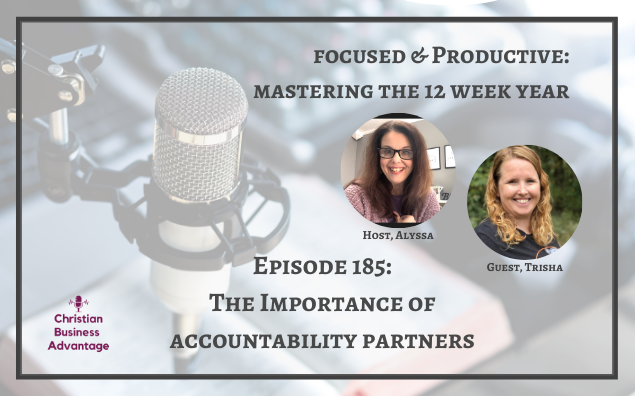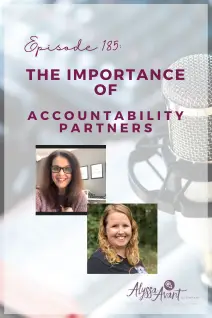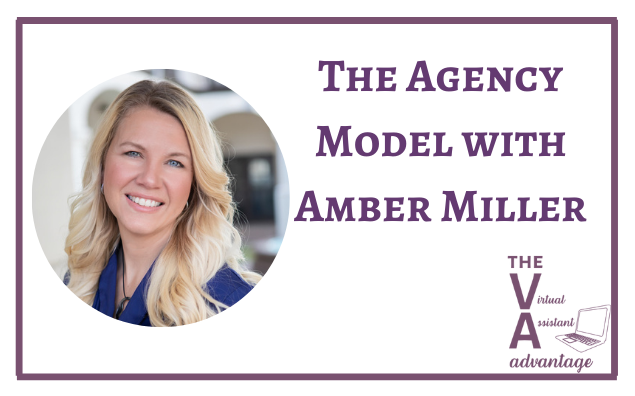The Importance of Accountability Partners
This month, my friend and accountability partner Trisha and I have been diving into The 12 Week Year concept, sharing how it has helped us set and track goals, stay motivated and maintain balance in our busy lives. Did you miss last week’s podcast episode? Click the link to learn how Creating a Weekly Plan for Your Goals enables you to track business and personal tasks, celebrate your progress and reach those goals! Today we explore the significance of having an accountability partner in business and how it strengthens focus and commitment. Read on to learn how accountability can drive success and foster encouragement without competition!

Relationship Not Competition
Alyssa: We’re going to talk about our relationship as accountability partners, but we are not competing against each other.
We are competing against ourselves. And that is one of the things that is important about The 12 Week Year – it’s all about commitment that you have to yourself. It’s about you taking ownership that these are my goals, these are things I want to accomplish, and it helps you to block out what you don’t have to focus on and just focus on what is important to you.
It makes you realize what’s truly important. Like summer, for example. I knew that I had a lot going on and we were facing a lot of stressful things in our personal lives. So I decided, Hey, I’m going to ask Trisha if it’s okay if we take off a 12 week span of time.
I’m really glad we did that because honestly, I felt so much more motivated when we came back to it just a week or so ago. Now I can focus on these big goals that we have.
The concept of The 12 Week Year is you are setting these goals for 12 weeks instead of for a year.
You are being more focused on those particular goals. Then you’re breaking those goals down into weekly and daily tasks or systems. Then you are measuring your progress by tracking, checking it off and creating that score for yourself.
Would you say that’s a pretty good summary of what we do?
Trisha: Absolutely.
We hold each other accountable. And you basically repeat the process. You take a reflection period and you reflect on what your next quarter is and then we take off for that 12 weeks.
The Concept of Accountability and How It Can Work
Alyssa: We’ve been doing this a long time. We initially started with a group of ladies and we had a weekly meeting.
We would meet on Zoom and we would all tell how our week went, what our scores were and what we could do to improve. That got a little bit overwhelming to do, so people started dropping by the wayside.
This past year, I believe it was, I decided to ask Trisha if she would want to do this, just she and I. We also decided that instead of doing a Zoom call every week, we would do Voxer which is an app on your phone that allows us to talk to each other anytime we want. It’s walkie talkie style, except if I’m not available when she’s walkie talking me, it records it and I can play it back later.
Now we are going to get into the idea of the accountability. I have always been encouraged since I was really young to have some accountability in my life, mainly in the area of my spiritual life. I can remember in youth group, for many years they encouraged us to have a friend, an accountability partner, a prayer partner.
When I was a senior in high school, my youth director had us come over for Bible study once a week. And then we met with our accountability partner, we prayed and we talked about our week. That was so helpful to me and it was a concept that has really stuck with me.
Even though Trisha lives in Ohio and I live in Mississippi, it still works in our business and personal goals. Our concept of accountability is to check in with each other on Voxer and say, How is your week going? Are you doing good? Is this a crazy week with the kids and everybody has a hundred things to do?
How would you describe how this works for us?
Trisha: Basically we took the idea and we just made it work for our lives because both of us have children. Both of us do a lot of things with our church. We run our own business.
We are very busy. You just have to try things and find out which works best. But what I love about Voxer is exactly what you said.
Positive Parameters for Accountability
Trisha: We set some parameters at the beginning that were, You respond when you can. I’m going to send you a message when I think about it, but just because there’s a message does not mean you need to respond. You respond when it works best for you and your family and your life and then we’ll go on from there.
Some weeks, you send me a message and said what I got this week or how I’m doing. In some weeks, I’ll send the message. It just depends on who thinks of it as they’re tallying up their scores for the week. It works perfect when you set those kind of parameters at the beginning.
Trisha: If I message you at nine in the morning and you’re running kids somewhere, you do not need to respond to me right now. So that’s been great.
Alyssa: Yes. That has been my favorite part, I think, because I usually set my goals for the next week or write out my tasks and stuff on Sunday afternoons.
I usually send Trisha a message if I’m able to that day, and I’m not distracted by something else. I’m able to send it to her and send her a picture of my score or I’ll say, this is my score for the week or whatever.
Voxer is nice because you can either send texts, pictures, or a voice message. And it’s always available to me when I’m ready to talk to her. I really like that.
So that accountability piece, I think, has helped both of us be able to continue to do this process, because I don’t think I would have stuck to The 12 Week Year concept if I had not had you available to me to help keep me going.
Trisha: 100%. I do mine a little different. I usually wrap up my score on Mondays; I don’t get to it on Sunday. So I tend to look at it Monday morning and then see what I need to plan for that week.
A lot of weeks, I don’t message you back until Monday morning and that’s totally fine.
I want people to understand how flexible this is. Yes, it’s a system. Yes it works. There’s some very specific things that you do as a part of this system, such as setting your goals, writing down your goals and tracking your goals.
Trisha: But as far as how you do all that is very flexible, and that’s what I like about it. I think that’s what has helped me to be successful with it. Because otherwise, I probably wouldn’t have stuck to it if it had not had that flexibility piece to it.
Accountability Plus Encouragement
Trisha: People, I think, get nervous about accountability. But if [Alyssa] texts me and says, I got a 60 this week, I’m not like, Way to go.
[Yet] I’m not giving her a hard time. It’s my job to encourage her and be like, all right next week we’re getting better, and see if there’s any way that I can help. So don’t be afraid.
You don’t have to be mean or tough to be an accountability partner. You really have to be there and just be encouraging.
Alyssa: Yes and be there for the person. Trisha has really helped. I know you all know that life happens and Trisha shared with you about that. I’ve had some really heavy things happen in the past year. My father in law has been diagnosed with cancer for a second time. I lost an aunt this past year.
I can’t even remember all the things that happened because it was like this avalanche. I knew that she understood and could be understanding and encouraging. That was super helpful for me to be able to say, Hey, I had a really tough week. I probably didn’t even score my week.
I’ve tried to do the same for her. On the opposite end of that, there were weeks Trisha was blowing it out of the water and I’m over here, like struggle bus.
You have to be excited for that person too. And truly encourage them in the good and the bad. So, accountability sounds like a bad word, but honestly, it is not! It is a super helpful thing. Even way back, when I was 16, 17, 18 years old, learning about accountability, one of the things I learned early on is that you’re both in there.
It’s for both of you. It’s not a me situation. It’s not a competition.
It will help you both to grow and I think that’s something that we’ve definitely experienced with this process. What do you think?
Trisha: I really feel like it’s key. It really just helps you to give that extra push in a great way and it pays off in the long run.
Qualities of a Good Accountability Partner
Alyssa: What are some of the things that you would encourage people to look for in an accountability partner? Like for example, I don’t think we had to have the same type of business for this to work.
One of the things I knew for certain with Trisha, because we’ve communicated with each other for so long, is I knew she would be honest with me. I knew she would follow through because she has done it so much in the past with what she was doing.
What are some things that you would encourage somebody to look for in accountability partner?
Trisha: I think those are good suggestions. I think for us also, like you said, we both have virtual assistant businesses, but we work with very different clients. Our clients are not the same. We’re not trying to take each other’s clients. Like we have very different niches, so it works out perfectly.
Does that help because we can ask each other ideas and things? Absolutely, we are on a similar path. So it may be helpful if you’re in an online business with another online business owner.
It does help for us to have more understanding because we are in a very similar season of life. We don’t have little kids. We have school age kids, so we could sometimes help each other in life as well. I think for me, those are the big things.
Like you said, I feel our values are very similar. I feel like it’s those maybe even character trait type things that are way more important.
Alyssa: Yeah. I would say those characteristics, morals and values have a lot more to do with it and the season of life that we’re in, because I’ve had accountability partners in the past that weren’t in the same season of life as me. That made it harder because I felt like they were not as understanding about my situation, like with my children, or if we’re going through something hard with my kids, that is a distraction to your business.
Family is more important and that’s one of the things Trisha and I agree upon – That is your family. We’re on the same page with that. Sort of how we put our family first over our businesses and how we have the same age kids. We both have kids in school or college. I have one in college. Those are really important pieces to make you more compatible with your accountability partner.
Trisha: And we both are running our business. Neither one of us can just drop off our income support for our families. So we are serious and wanting to move towards our goals. That also helps.
Alyssa: Yes. We have that in common as well. We both have to provide; we have the need to provide an income.
This is not a hobby for us, it’s a serious business. It brings in income and helps to support our families. That is another important piece to how your accountability partner needs to be on the same page with you. You would want somebody if you’re in business to have a business that they are serious about versus a hobby.
We have one more episode in this Focused & Productive: Mastering The 12 Week Year September series!
The podcast conversation continues next week when we discuss how The 12 Week Year has helped us to hold each other accountable and best of all, see the results in our businesses! May this series motivate you to go pick up your copy of The 12 Week Year by Brian P. Moran and integrate the concept into your own life!
Questions? Join the Group!
If you have specific questions about hosting a virtual summit, I’d love to get those because that would help me to make sure that I’m covering everything that you’re interested in knowing during this series on the podcast. You can submit your questions inside The Christian Business Advantage Facebook group. I look forward to seeing you there!








One Comment